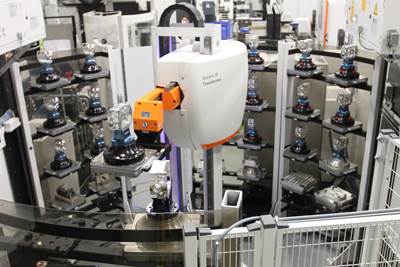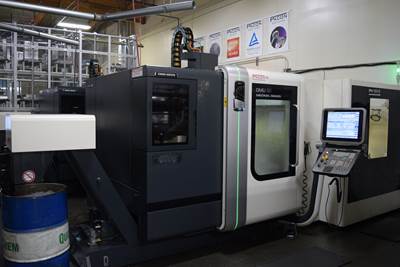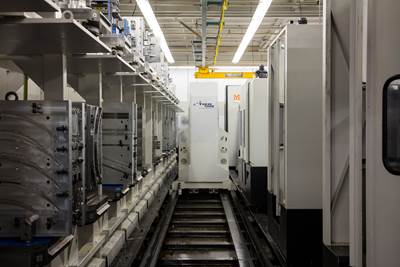Share


Sales growth, customer retention, extensive use of social media and, of course, profit margin are just a few of the metrics that stood out about Rimeco Products while evaluating potential Top Shops honors program winners for the business strategy category. Although much has changed for Rimeco in recent years, the story behind the metrics is also one of history repeating itself.
This nearly 30-year-old shop near Cleveland, Ohio, redefined itself in 2010 by pivoting toward a specific subset of aerospace industry work. In the process of proving itself to new customers, Rimeco proved the worth of an in-house invention that could also be sold to other manufacturers.

Invented by the company’s founders more than 20 years ago, the Kwik-Clamp quick-change workholding system has come to define the process at Rimeco Products. All Photos: Rimeco Products.
As for more recent growth, the company has expanded into a new facility that houses enough additional equipment to double its former capacity. Again, another one of the company’s own tools is helping to speed the advance of the manufacturing process driving this growth. This newer product is also being sold to other machining businesses along with a renewed push for the first one, this time with the aid of modern media and marketing strategies.
Focusing In
The first product Rimeco developed was the Kwik-Clamp, a pneumatic, quick-change system for swapping pallets and fixtures. It was conceived by company President John Ribic’s father and uncle in the mid-1990s. Now popularized in machine shops in various forms, quick-change workholding is all about minimizing the downtime and quality problems associated with job changeovers by providing a reliable, repeatable means of performing and validating setups offline.
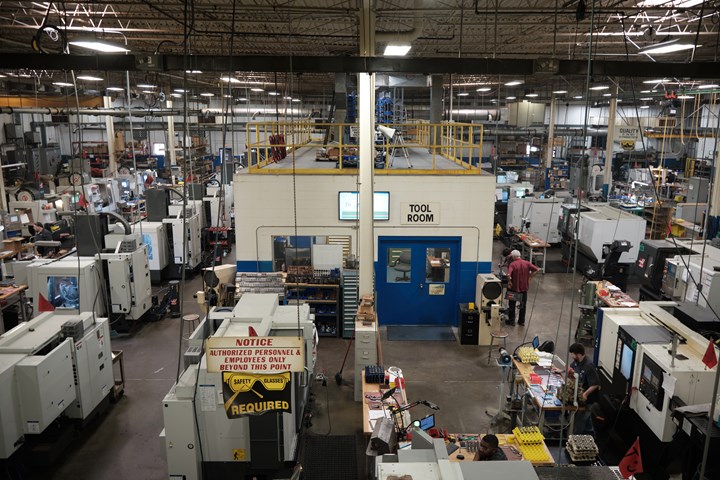
Rimceo standardized on machine tools as well as quick-change fixturing to scale up into its chosen niche of work. Lately it has been adding five-axis machines, particularly since moving into a larger facility.
A much smaller shop at the time, Rimeco lacked the resources to market Kwik-Clamp as broadly as his father and uncle would have liked, Mr. Ribic says. Internally, however, the system came to define the shop’s process. Rimeco standardized largely on milling machines from Haas, and fitted each with a fourth-axis rotary table and a Kwik-Clamp unit. Common workstations with fast, accurate and error-free setups of a wide range of parts helped put the company in position to take advantage of business opportunities in the growing aerospace market.
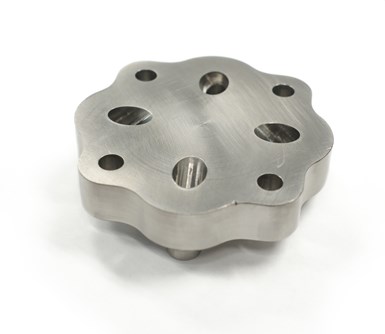
Rimeco specializes in air and fluid conveyance systems characterized by difficult-to-machine materials and sculpted channels with stringent surface finish and precision requirements.
One such opportunity was already on the shop floor, in the form of a long-running job that the company had considered abandoning. One of the chief problems with this job was the material: Inconel, an alloy that is subject to work hardening that degrades cutting tools quickly. However, cutting tools had gotten better over the years, and machining techniques had advanced. Abandoning heavy roughing in favor of lighter, faster cuts made it practical to put the
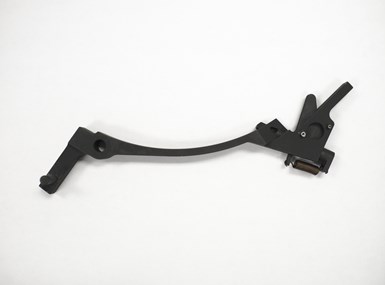
parts on Kwik-Clamp units, which made it feasible to take on more of the work. “We were at a point where we needed to either cut that business entirely or really focus in on it,” Mr. Ribic recalls about the job. Now, the company considers itself a specialist in machining Inconel and 321 stainless steel, particularly for jet engine air and fluid conveyance systems.
Breaking Out
Getting there was not easy. The contoured, generally tubular parts that make up the complex networks of channels within an engine must be perfectly smooth, which would require new machining techniques as well as expertise in cross-hole deburring. More tools would be required for each job, including specialty form tools used to cut features such as a 0.015- to 0.018-inch-thick “weld lip” on the edge of many parts. Employees would need to learn new techniques to meet requirements for a maximum edge break of 0.005 inch. Raw material costs would increase, too. Expanding beyond a single job and customer would also require AS9100 certification. Nonetheless, “We needed to find a niche — something consistent,” Mr. Ribic says. “We were tired of competing with 50 other shops for the same work.”
As demand for jet engines climbed, Rimeco grew along with its customer, eventually adding new contracts and solidifying a place as a second-tier supplier of air and fluid conveyance systems to the likes of G.E. Aviation, Parker Aerospace, Pratt & Whitney and Rolls Royce. Rimeco’s scale-up continued all the way to the point when Mr. Ribic filled out the 2020 Top Shops survey, with sales growing from $3 to $10 million from 2016 to 2019.

The latest versions of Kwik-Clamp are loaded via cobot rather than by hand into both five- and three-axis machine tools.
In 2018, the company relocated from a 12,000-square-foot plant to a 45,000-square-foot facility in Willoughby, Ohio. More people and more machines have driven the development of a tiered “level” system that makes shopfloor education efficient and effective. It also ensures the right people perform the right tasks (for example, there is a big difference between working with, say, a flange with a bolt-hole pattern and a complex five-axis nozzle). Job descriptions are different off the shop floor, too, where new personnel have been added in areas like human resources and accounting. Virtually everything is documented, even for solely internal purposes (examples include official machine-crash and part-nonconformance reports as well as in-house training videos).
History Repeats
Kwik-Clamp remains ubiquitous on the shop floor. However, the quick-change system now works with five-axis machines as well as four-axis machines, and in many cases, the loading and unloading is done by collaborative robots rather than people.
Another difference from the company’s early days is that offline fixture setups are easier thanks to another Rimeco invention: the ParaKeep parallel keeper, a device used to keep vise jaws open. Compared to the keepers the company used to purchase from workholding suppliers, these spring-loaded devices are smaller, easier to adjust and easier to store, Mr. Ribic says.

The ParaKeep parallel vise keeper is another product invented for in-house use that has since been brought to market.
This time, however, marketing is a priority. The company has sold almost 2,000 Parakeeps during the past half-decade or so without much of a concerted push, Mr. Ribic says. As part of this effort, the shop is also pushing to sell the Kwik-Clamp again. Marketing tools include a mix of Facebook, Twitter, LinkedIn, Instagram, Pinterest and YouTube social media platforms as well as Google Ads. All three company websites (one for Rimeco, one for Kwik-Clamp and one for ParaKeep) have a new look. “We’ve been putting together a full marketing budget for Kwik-Clamp and ParaKeep,” Mr. Ribic says, including potentially advertising in media outlets like this one.
The pandemic has not dampened his spirits, despite its effect on the shop and the aerospace industry as a whole. Perhaps this is for good reason. Beyond earning its place among this year’s Top Shops, Rimeco’s story is one of aligning people, process and technology toward providing something that few others can replicate, and from there, finding new ways to capitalize on expertise. In fact, given what the shop has done by combining Kwik-Clamp with five-axis machines and cobots, the timing of renewed marketing efforts might well be right. “One thing about this virus is that everyone is paying more attention to automation,” he says. As for ParaKeep, “that’s something every machinist could have in the toolbox.”
Related Content
Registration Opens for 2025 Top Shops Conference
Unlock benchmarking insights, shop secrets, and a behind-the-scenes NASCAR tour, only at this year’s Top Shops Conference.
Read MoreLast Chance! 2025 Top Shops Benchmarking Survey Still Open Through April 30
Don’t miss out! Modern Machine Shop's Top Shops Benchmarking Survey is still open — but not for long. This is your last chance to a receive free, customized benchmarking report that includes actionable feedback across several shopfloor and business metrics.
Read MoreThe Human Impact of Machining Technology
SSP’s commitment to adopting the latest machining technology benefits not only the business, but its employees as well.
Read MoreAnnouncing the 2025 Top Shops Honorees
This year’s honorees exemplify innovation, leadership, and operational excellence in the machining industry.
Read MoreRead Next
When Machining Lights Out Leaves Nothing Out
A Top Shops honors program winner strives to ensure every part crosses paths with a robot, cobot or pallet changer.
Read MoreStandardization Leans the Way to High-Mix Automation
An increasingly digitalized, lean manufacturing process begins with a common selection of cutting tools and five-axis machining fixtures.
Read MoreTop-Tier Culture Keeps Top Shop Staffed
Interpersonal harmony, personal accountability, peace of mind, and an inner drive to improve help this shop compete in a tight market for CNC machining talent.
Read More
























